Republican governors ask Biden administration to rescind Title IX guidance
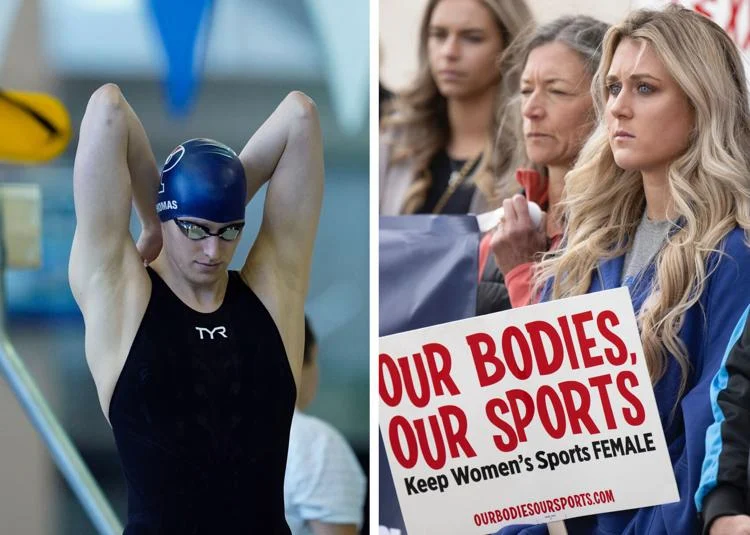
Twenty-five of the nation’s 26 Republican governors have asked the Biden administration to shelve its intent to expand Title IX protections to transgender athletes. The letter, led by the signature of Mississippi Gov. Tate Reeves, says the U.S. Department of Education’s proposed regulation should be withdrawn pending litigation that could be addressed by the U.S. Supreme Court. “The Department’s proposed regulation would attempt to coerce compliance with an uncertain, fluid, and completely subjective standard that is based on a highly politicized gender ideology,” the letter reads. The letter comes as the public comment period ends Monday on a proposed revision to Title IX that would ban state and local governments from prohibiting transgender students from participating on sports teams aligned with their gender identity. Title IX was created to increase opportunities for female athletes. Federal funds can be withheld from those found to be in violation. The law, which was passed in 1972, prohibits discrimination based on sex for school districts, universities, museums, and other educational institutions that receive federal funds. “Compelling a subjective, athlete-by-athlete analysis controlled by a student’s self-identified ‘gender identity’ enforced under threat of Department retribution affords no clarity,” the letter reads. “It does the opposite. This ‘fluid’ subjective standard ensures chaos and confusion in schools and will no doubt result in protracted and disruptive litigation.” Twenty-one states prohibit transgender students from participating on sports teams that do not align with their biological sex at birth, according to the Movement Advancement Project that tracks state policies. The letter was signed by Alabama Gov. Kay Ivey, Alaska Gov. Mike Dunleavy, Arkansas Gov. Sarah Sanders, Florida Gov. Ron DeSantis, Georgia Gov. Brian Kemp, Idaho Gov. Brad Little, Indiana Gov. Eric Holcomb, Iowa Gov. Kim Reynolds, Missouri Gov. Mike Parson, Montana Gov. Greg Gianforte, Nebraska Gov. Jim Pillen, Nevada Gov. Joe Lombardo, New Hampshire Gov. Chris Sununu, North Dakota Gov. Doug Burgum, Ohio Gov. Mike DeWine, Oklahoma Gov. Kevin Stitt, South Carolina Gov. Henry McMaster, South Dakota Gov. Kristi Noem, Tennessee Gov. Bill Lee, Texas Gov. Greg Abbott, Utah Gov. Spencer Cox, Virginia Gov. Glenn Youngkin, West Virginia Gov. Jim Justice, and Wyoming Gov. Mark Gordon. The signature of Vermont Republican Gov. Phil Scott is not on the letter. Republished with the permission of The Center Square.
Pete Buttigieg warns Norfolk Southern to support Ohio community

Transportation Secretary Pete Buttigieg sent a letter Sunday to the CEO of Norfolk Southern, warning that the freight rail company must “demonstrate unequivocal support for the people” of East Palestine, Ohio, and surrounding areas after a fiery train derailment led to the release of chemicals and residents expressing concerns about their health. “Norfolk Southern must live up to its commitment to make residents whole — and must also live up to its obligation to do whatever it takes to stop putting communities such as East Palestine at risk,” Buttigieg wrote. “This is the right time for Norfolk Southern to take a leadership position within the rail industry, shifting to a posture that focuses on supporting, not thwarting, efforts to raise the standard of U.S. rail safety regulation.” Ohio Gov. Mike DeWine said Friday that the chemicals that spilled into the Ohio River are no longer a risk, even as people in the community say they have constant headaches and irritated eyes. The state plans to open a medical clinic in the village of 4,700 to analyze their symptoms, despite repeated statements that air and water testing has shown no signs of contaminants. Still, uncertainty persists about the consequences of a derailment that occurred roughly two weeks ago. Peter DeCarlo, a professor of environmental health and engineering at Johns Hopkins University, told ABC News on Sunday that more testing is needed to determine which chemicals are present. “We just don’t have the information we need to understand what chemicals may be present,” DeCarlo said. “We know it started as vinyl chloride, but as soon as you burn that, all bets are off. You have a lot of chemical byproducts that can happen from a combustion process like that.” Asked if he would move back to East Palestine if he were already living there, DeCarlo said: “I have two little boys. I would not.” Norfolk Southern CEO Alan Shaw issued a statement on Saturday that he “returned to East Palestine today to meet with local leaders, first responders, and a group of Norfolk Southern employees who live in the area.” “In every conversation today, I shared how deeply sorry I am this happened to their home,” Shaw said. The Atlanta-based company has created a website with updates, NSMakingItRight.com. The transportation secretary’s letter on Sunday came across as a stern warning to Norfolk Southern, saying: “It is imperative that your company be unambiguous and forthright in its commitment to take care of the residents — now and in the future.” Buttigieg said the National Transportation Safety Board is investigating the cause of the derailment and that the Federal Railroad Administration is also analyzing whether safety violations occurred and will hold Norfolk Southern accountable if violations did occur. The Environmental Protection Agency has said the company must document the release of hazardous contaminants and outline cleanup actions. But Buttigieg also said that Norfolk Southern and other rail companies “spent millions of dollars in the courts and lobbying members of Congress to oppose common-sense safety regulations, stopping some entirely and reducing the scope of others.” He said the effort undermined rules on brake requirements and delayed the phase-in for more durable rail cars to transport hazardous material to 2029, instead of the “originally envisioned date of 2025.” The transportation secretary said the results of the investigation are not yet know, but “we do know that these steps that Norfolk Southern and its peers lobbied against were intended to improve rail safety and to help keep Americans safe.” Republished with the permission of The Associated Press.
25 GOP governors ask Biden administration to hit pause on broader clean water rule

Twenty-five Republican governors oppose a revised federal rule regulating U.S. waterways, citing uncertainty from an undecided U.S. Supreme Court case related to the rule. The governors sent a letter to the Biden administration on Monday asking it to delay the implementation of the revised Waters of the United States rule since the U.S. Supreme Court is currently considering Sackett v. EPA. The revised WOTUS rule, released on Dec. 30, reinstates pre-2015 water protections under the federal Clean Water Act. The rule was scaled back under the Trump administration, which triggered lawsuits from environmental groups. “The substance of the rule hinders State governments as we seek to give clarity and consistency to businesses, farms, and individuals regarding the regulatory framework for water,” the 25 GOP governors wrote. “The broad definitions used in the 514- page document only add to the confusing and complicated history of WOTUS. In fact, it appears that the EPA is seeking to regulate private ponds, ditches, and other small water features.” The U.S. Environmental Protection Agency said in December the revised rule applies to “traditional navigable waters, the territorial seas, interstate waters, as well as upstream water resources that significantly affect those waters.” “When Congress passed the Clean Water Act 50 years ago, it recognized that protecting our waters is essential to ensuring healthy communities and a thriving economy,” EPA Administrator Michael Regan said in a statement. “Following extensive stakeholder engagement, and building on what we’ve learned from previous rules, EPA is working to deliver a durable definition of WOTUS that safeguards our nation’s waters, strengthens economic opportunity, and protects people’s health while providing greater certainty for farmers, ranchers, and landowners.” The governors also questioned the timing of the new rule, given ongoing inflation. “Another burdensome and overbroad regulation from the federal government could not come at a worse time for America,” they wrote. “Having already squandered much of America’s energy independence, you should not increase costs for consumers by tying up energy production with even more red tape.” Environmental groups praised the Biden administration’s revised WOTUS rule. “This comes at a time when we’re seeing unprecedented attacks on federal clean water protections by polluters and their allies,” Jon Devine, director of federal water policy for the Natural Resources Defense Council, said in a statement last month. “While the nation still has significant work to do to fully protect important waters, it’s encouraging to see the country taking a step in the right direction to protect the waters we need for everyone’s health and the environment.” The letter was signed by Idaho Gov. Brad Little, Alabama Gov. Kay Ivey, Alaska Gov. Mike Dunleavy, Arkansas Gov. Sarah Sanders, Florida Gov. Ron DeSantis, Georgia Gov. Brian Kemp, Indiana Gov. Eric Holcomb, Iowa Gov. Kim Reynolds, Mississippi Gov. Tate Reeves, Missouri Gov. Mike Parson, Montana Gov. Greg Gianforte, Nebraska Gov. Jim Pillen, Nevada Gov. Joe Lombardo, New Hampshire Gov. Chris Sununu, North Dakota Gov. Doug Burgum, Ohio Gov. Mike DeWine, Oklahoma Gov. Kevin Stitt, South Carolina Gov. Henry McMaster, South Dakota Gov. Kristi Noem, Tennessee Gov. Bill Lee, Texas Gov. Greg Abbott, Utah Gov. Spencer Cox, Virginia Gov. Glenn Youngkin, West Virginia Gov. Jim Justice, and Wyoming Gov. Mark Gordon. Republished with the permission of The Center Square.
GOP governors to Joe Biden: Student loan plan will be costly for American taxpayers
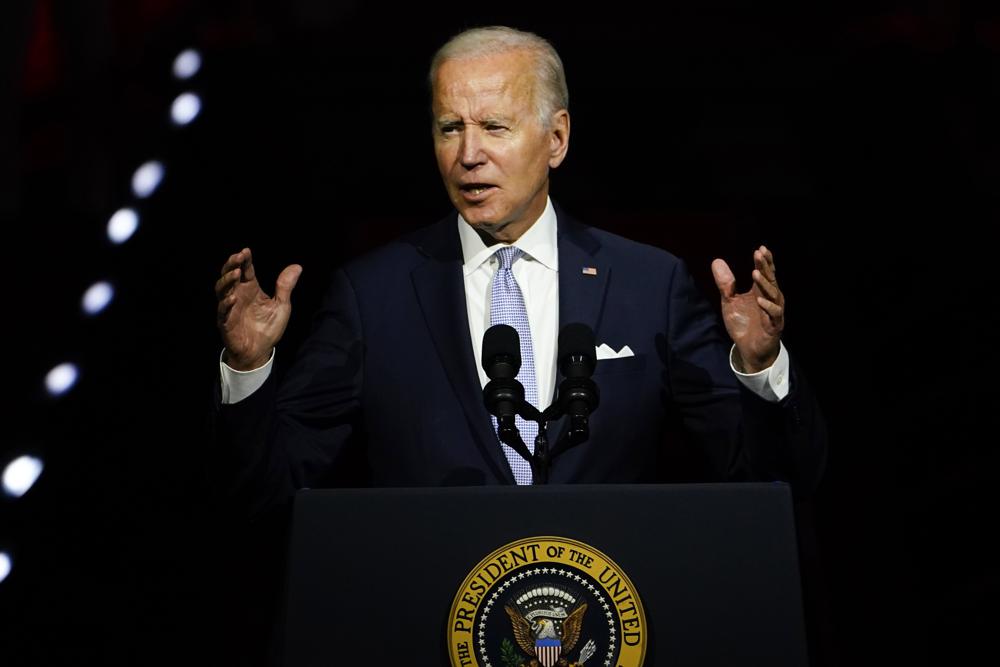
President Joe Biden’s student loan forgiveness plan will be costly for American taxpayers, a coalition of GOP governors said in a letter sent Monday to the White House. The letter, signed by 22 GOP governors, tells Biden to “withdraw” the plan, citing cost estimates of up to $600 billion, or $2,000 per American taxpayer. “As governors, we support making higher education more affordable and accessible for students in our states, but we fundamentally oppose your plan to force American taxpayers to pay off the student loan debt of an elite few,” the coalition wrote. The coalition includes Alabama Gov. Kay Ivey, Alaska Gov. Mike Dunleavy, Arizona Gov. Doug Ducey, Arkansas Gov. Asa Hutchinson, Florida Gov. Ron DeSantis, Georgia Gov. Brian Kemp, Idaho Gov. Brad Little, Iowa Gov. Kim Reynolds, Maryland Gov. Larry Hogan, Missouri Gov. Mike Parson, Montana Gov. Greg Gianforte, Nebraska Gov. Pete Ricketts, New Hampshire Gov. Chris Sununu, North Dakota Gov. Doug Burgum, Ohio Gov. Mike DeWine, Oklahoma Gov. Kevin Stitt, South Carolina Gov. Henry McMaster, South Dakota Gov. Kristi Noem, Tennessee Gov. Bill Lee, Texas Gov. Greg Abbott, Utah Gov. Spencer Cox, and Wyoming Gov. Mark Gordon. “At a time when inflation is sky high due to your unprecedented tax-and-spend agenda, your plan will encourage more student borrowing, incentivize higher tuition rates, and drive-up inflation even further, negatively impacting every American,” the governors added. Biden announced the plan last month during an address from the White House. “Many people – many people can’t qualify for a mortgage or buy a home because the debt they continue to carry,” Biden said. “A lot of folks are even putting off starting families because of the cost, and the dream of starting or owning your business is just way off in the distance with a debt that’s – that so many are saddled with.” The plan forgives $10,000 in federal student loan debt for those who make less than $125,000 annually, while federal Pell Grant recipients will be forgiven $20,000. The Committee for a Responsible Federal Budget has estimated that the plan’s total cost would be $440 to $600 billion. Republished with the permission of The Center Square.
States adding to financial pressure on Russia over war
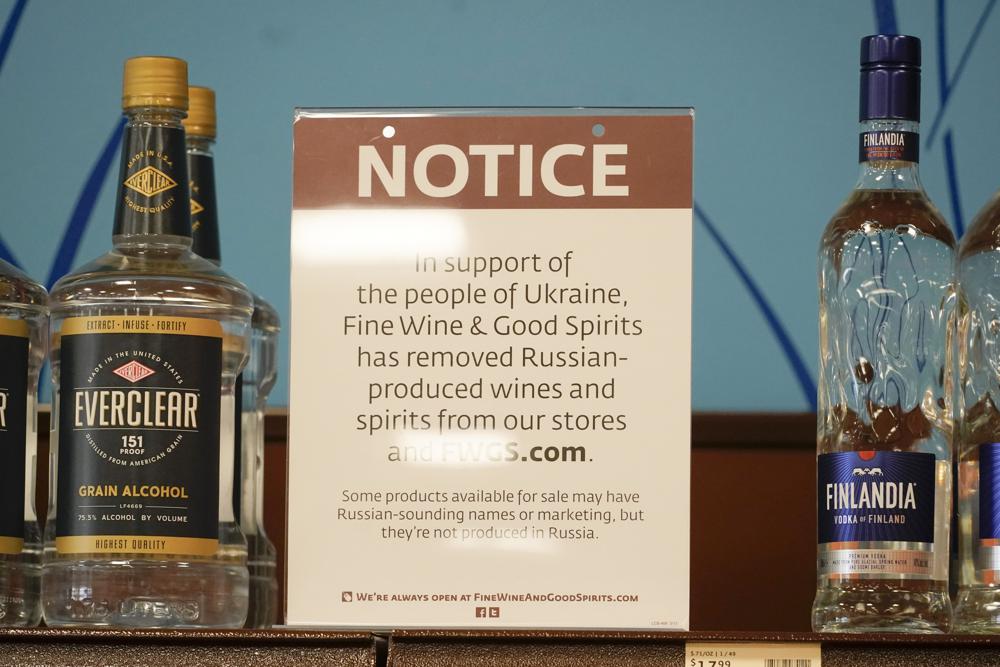
Seeking to tighten the financial squeeze on Russia over its war against Ukraine, governors, and lawmakers in numerous U.S. states were taking actions Monday to pull state investments from Russian companies while encouraging private entities to do the same. The effect of sanctions by U.S. states often pales in comparison to national ones, but state officials said they wanted to show solidarity with Ukraine and do what they could to build upon the penalties imposed on Russia by the U.S. government and other Western nations. Georgia House Speaker David Ralston, a Republican, got a bipartisan standing ovation Monday when he told representatives he would seek to have the state’s retirement funds quickly divested from any Russian assets. “I don’t know about y’all, but I don’t want one penny of Georgians’ money going to subsidize Vladimir Putin,” Ralston said. “While our role in international affairs is limited, we make clear we stand with those who want to live in peace.” Some actions have been largely symbolic. The governors of Arizona, Pennsylvania, and Tennessee ordered their capitols lit with the blue and yellow colors of Ukraine’s flag. Minnesota Gov. Tim Walz, a Democrat, and Ohio Gov. Mike DeWine, a Republican, issued a joint statement condemning Russia’s invasion of Ukraine as co-chairs of the presidentially appointed Council of Governors. Other state actions have potential teeth. On Monday, the Indiana House passed legislation that would block Russian-controlled businesses and nonprofits from acquiring property in Indiana for one year. It now goes to the Senate. “Indiana will not be a safe haven for ill-gotten Russian funds, nor for its oligarchs trying to find financial shelter in the wake of Putin’s unconscionable invasion of Ukraine,” Democratic state Rep. Ryan Dvorak said while proposing the amendment last week. New York Gov. Kathy Hochul signed an executive order Sunday forbidding her state from doing business with Russia. She ordered state agencies to divest money and assets from companies or institutions aiding Russia in its war against Ukraine. The Democratic governor also said New York would welcome Ukrainian refugees, noting that New York already is home to the largest Ukrainian population in the U.S. Pennsylvania lawmakers said Monday they will file legislation requiring state pension funds to pull investments connected to the Russian government and its critical supporters. The state Treasury Department also has begun divesting its minimal holdings in Russian-based companies. In a memo to fellow senators, Democratic state Sen. Sharif Street said Pennsylvania “must wield our economic power to ensure that Russia faces grave consequences for their flagrant violations of international law and human cooperation.” Pennsylvania House Majority Leader Kerry Benninghoff, a Republican seeking co-sponsors for the legislation, said state lawmakers “have a moral obligation to ensure that our public fund investments are not inadvertently supporting those who are engaging in an unprovoked invasion of their democratically elected neighbors.” Arkansas lawmakers have filed proposals authorizing banks in the state to freeze the assets of Russian oligarchs and to require a boycott of Russian-made goods. A bipartisan group of California lawmakers said Monday they also will introduce legislation to divest public money from Russian state entities. Colorado Gov. Jared Polis, a Democrat, has banned state agencies from doing business with Russian state-owned firms and their subcontractors. Colorado’s $61 billion state pension fund is pulling $8 million from a Russian state-owned bank identified in federal sanctions. Governors in Connecticut, New Jersey, Virginia, and Washington also have ordered a review of whether any state money is going to Russian companies or investments supporting the Russian government. A North Dakota investment board was due to meet later this week to discuss its investments in Russia. “If our state can put one brick in the wall around Putin, it will be a good thing, and we intend to do all that we can in this regard,” said Washington Gov. Jay Inslee, a Democrat. Two prominent Republican governors, Florida’s Ron DeSantis and South Dakota’s Kristi Noem, who are widely seen as angling for a White House bid, mostly took aim at President Joe Biden rather than issue executive orders targeting Russia. They criticized his energy policies and said that had made it difficult to slap sanctions on Russia’s exports of oil and gas. Other governors are seeking to sever good-will relationships between their home states and those in Russia. Republican Gov. Larry Hogan announced Monday that he’s dissolving Maryland’s decades-old sister-state relationship with Russia’s Leningrad region after the invasion of Ukraine. Virginia Gov. Glenn Youngkin, a Republican, asked the cities of Norfolk and Roanoke to end their sister city partnerships with Russian cities. Iowa Gov. Kim Reynolds, a Republican, called for an end to its sister-state relationship with Stavrapol Krai, Russia, and a strengthening of its sister-state relationship with Cherkasy Oblast, Ukraine. Several states have expressed a willingness to provide housing to Ukrainian refugees. The Washington state House and Senate each have added amendments to their budget proposals setting aside $19 million to provide services and temporary housing to refugees who come from Ukraine. Texas Gov. Greg Abbott, a Republican, posted on Twitter over the weekend that he has asked restaurants and retailers “ to voluntarily remove all Russian products from their shelves.” Officials in Alabama, Iowa, New Hampshire, Ohio, Pennsylvania, Utah, Vermont, Virginia, and West Virginia — all states that control the sale of alcohol — have directed Russian-sourced alcohol to be removed from store shelves. “Utah stands in solidarity with Ukraine and will not support Russian enterprises, no matter how small the exchange,” Republican Utah Gov. Spencer Cox said. Republished with the permission of the Associated Press.
Kay Ivey wants Joe Biden to prioritize getting states 2020 Census data

Gov. Kay Ivey and fourteen other governors wrote a joint letter to Secretary of Commerce Gina Raimondo urging a swift release of the census redistricting information. The letter addresses the main issue: the delay in releasing the data has made state legislatures unable to redraw district lines before the 2022 election cycle. The letter stated, “While we recognize the difficulties associated with completing a decennial census amid a pandemic, the ongoing delay in the release of 2020 Census redistricting data places our states in a nearly impossible situation to redraw lines prior to the 2022 election cycle. Consequently, we urge you to release redistricting data this month or as soon as possible prior to the delayed release date of September 30, 2021, and the release of the “legacy format” data on August 16, 2021.” The 2020 Census became a challenge to complete during the pandemic. In July 2020, Ivey warned the state’s current participation rate was 59.8%, or two percentage points behind the national average. At the time, Alabama was in danger of losing House seats because of a lack of participation. On Twitter, Ivey commented, “The stakes were high for Alabama in the #2020Census, and because of our efforts on the local and state levels, we succeeded. I’m proud to join fellow governors in urging the Biden Administration to not further delay the release of the redistricting data.” The stakes were high for Alabama in the #2020Census, and because of our efforts on the local and state levels, we succeeded. I’m proud to join fellow governors in urging the Biden Administration to not further delay the release of the redistricting data. #alpolitics @SecRaimondo pic.twitter.com/oMxsIodsoK — Governor Kay Ivey (@GovernorKayIvey) June 22, 2021 The letter continued, “Districts for the U.S. House of Representatives cannot be drawn until the data has been released. Districts for state legislatures also cannot be drawn until this data has been released. Districts for county, parish, township and municipal governing bodies cannot be drawn until states have had the opportunity to draw congressional and state legislative districts. Lastly, districts for school district seats cannot be drawn until county, parish, township, and municipal governing bodies have had the opportunity to draw their own respective districts. As a result of such negative impacts to our constitutional responsibilities, we seek the release of redistricting data as soon as possible—and in line with traditional timelines—so that states may begin to perform important redistricting tasks on behalf of our constituents.” Other governors signing the letter were Asa Hutchinson (AR), Brian Kemp (GA), Ron DeSantis (FL), Doug Ducey (AZ), Kim Reynolds (IA), Mike Parson (MO), Pete Ricketts (NE), Greg Gianforte (MT), Mike DeWine (OH), Henry McMaster (SC), Bill Lee (TN), Greg Abbott (TX), and Mark Gordon (WY), Doug Burgum (ND).
Joe Biden announces Uber, Lyft rides amid July 4 vaccine push
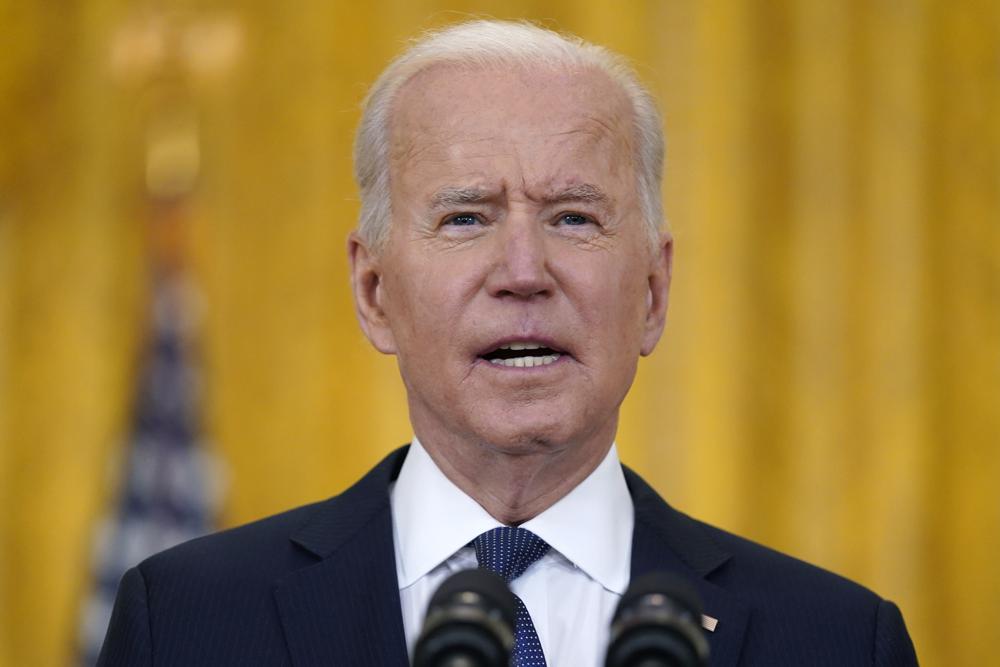
President Joe Biden is highlighting new efforts to encourage Americans to get COVID-19 shots, including free rides to and from vaccination sites from ride-sharing companies Uber and Lyft, as the pace of shots nationally declines and he looks to meet his July Fourth inoculation targets. The partnership with the ride-sharing companies marked the latest in a series of government-encouraged efforts to increase access to shots, including numerous state and local efforts to provide perks to drive Americans to get vaccinated. It comes as Biden met virtually with a bipartisan group of governors Tuesday to share best practices for encouraging Americans to roll up their sleeves. “We have to make it easier and more convenient for all Americans to get vaccinated,” Biden said, as he met with Utah Gov. Spencer Cox, Massachusetts Gov. Charlie Baker and Ohio Gov. Mike DeWine, all Republicans, as well as Democratic Govs. Michelle Lujan Grisham of New Mexico, Janet Mills of Maine, and Tim Walz of Minnesota. “I think that’s really stepping up,” Biden said of the partnership with the ride-sharing companies. Biden also announced new funding through the Federal Emergency Management Agency for community outreach efforts to encourage Americans to get vaccinated, as well as a new initiative to host federally supported vaccination sites at community colleges. During the meeting, Biden asked the governors to share their innovations to boost vaccine uptake, from mobile vaccination clinics to incentives like tickets to minor league baseball games or promotions at retailers like L.L. Bean. “I think you’ve done incredible work,” Biden said of the governors. “None of this could work without your leadership.” Cox pressed Biden for assistance in highlighting the role of vaccinations bringing about a return to normalcy, echoing a growing complaint of public health professionals and others at the caution of the Biden administration in releasing guidance for those who are fully vaccinated. “One area where we can use some help from the White House and others, and that is modeling what a fully vaccinated person can do,” said Cox. “I like to say that we have fully vaccinated people, we should start acting like it,” calling it a motivating force for those who haven’t yet gotten a shot. “I think you’re going to see a more aggressive effort on our part to lay out that it’s not only you can hug your grandchildren, you can do a lot more,” Biden responded. Biden’s meeting comes a week after he set a new goal of delivering at least one dose of vaccine to 70% of adult Americans by Independence Day and fully vaccinating at least 160 million by then. On Tuesday, the White House told governors that states had chosen not to accept 2.5 million doses of the nearly 18 million available to them this week due to declining interest. The administration did not reveal the complete list, though states like Iowa have been vocal about not needing additional vaccine supply given current demand. The nation’s vaccination rate has dramatically slowed in recent weeks. According to the Centers for Disease Control and Prevention, an average of about 690,000 Americans are getting their first dose of vaccine daily, down from a peak of more than 1.9 million per day a month ago. Biden’s virtual meeting with governors was streamed online without reporters present. Republished with the permission of the Associated Press.
Heavily fortified statehouses around U.S. see small protests
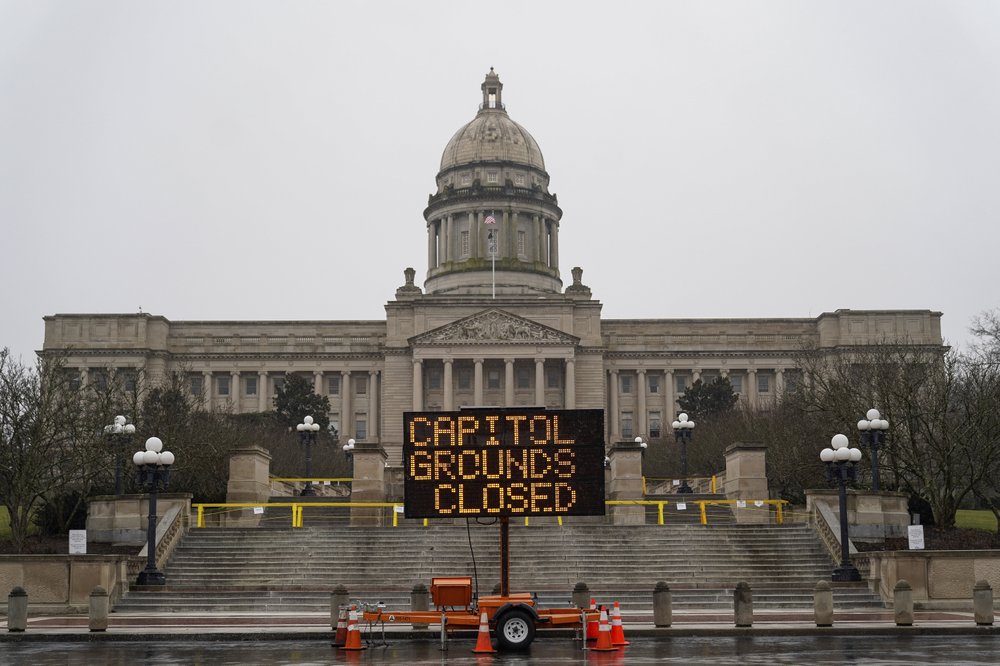
Small groups of right-wing protesters — some of them carrying rifles — gathered outside heavily fortified statehouses around the country Sunday, outnumbered by National Guard troops and police brought in to prevent a repeat of the violence that erupted at the U.S. Capitol. As darkness fell, there were no reports of any clashes. Security was stepped up in recent days after the FBI warned of the potential for armed protests in Washington and at all 50 state capitol buildings ahead of President-elect Joe Biden’s inauguration on Wednesday. Crowds of only a dozen or two demonstrated at some boarded-up, cordoned-off statehouses, while the streets in many other capital cities remained empty. Some protesters said they were there to back President Donald Trump. Others said they had instead come to voice their support for gun rights or decry government overreach. “I don’t trust the results of the election,” said Michigan protester Martin Szelag, a 67-year-old semi-retired window salesman from Dearborn Heights. He wore a sign around his neck that read, in part, “We will support Joe Biden as our President if you can convince us he won legally. Show us the proof! Then the healing can begin.” As the day wore on with no bloodshed around the U.S., a sense of relief spread among officials, though they were not ready to let their guard down. The heavy law enforcement presence may have kept turnout down. In the past few days, some extremists had warned others against falling into what they called a law enforcement trap. Washington State Patrol spokesman Chris Loftis said he hoped the apparently peaceful day reflected some soul-searching among Americans. “I would love to say that it’s because we’ve all taken a sober look in the mirror and have decided that we are a more unified people than certain moments in time would indicate,” he said. The security measures were intended to safeguard seats of government from the type of violence that broke out at the U.S. Capitol on Jan. 6, when far-right Trump supporters galvanized by his false claims that the election had been stolen from him overran the police and bashed their way into the building while Congress was certifying the Electoral College vote. The attack left a Capitol police officer and four others dead. More than 125 people have been arrested over the insurrection. Dozens of courts, election officials, and Trump’s own attorney general have all said there was no evidence of widespread fraud in the presidential race. On Sunday, some statehouses were surrounded by new security fences, their windows were boarded up, and extra officers were on patrol. Legislatures generally were not in session over the weekend. Tall fences also surrounded the U.S. Capitol. The National Mall was closed to the public, and the mayor of Washington asked people not to visit. Some 25,000 National Guard troops from around the country are expected to arrive in the city in the coming days. U.S. defense officials told The Associated Press those troops would be vetted by the FBI to ward off any threat of an insider attack on the inauguration. The roughly 20 protesters who showed up at Michigan’s Capitol, including some who were armed, were significantly outnumbered by law enforcement officers and members of the media. Tensions have been running high in the state since authorities foiled a plot to kidnap Democratic Gov. Gretchen Whitmer last year. At the Ohio Statehouse, about two dozen people, including several carrying long guns, protested outside under the watchful eyes of state troopers before dispersing as it began to snow. Kathy Sherman, who was wearing a visor with “Trump” printed on it, said she supports the president but distanced herself from the mob that breached the U.S. Capitol. “I’m here to support the right to voice a political view or opinion without fear of censorship, harassment or the threat of losing my job or being physically assaulted,” she said. Ohio Gov. Mike DeWine, a Republican, said he was pleased with the outcome but stressed that authorities “continue to have concerns for potential violence in the coming days, which is why I intend to maintain security levels at the Statehouse as we approach the presidential inauguration.” Utah’s new governor, Republican Spencer Cox, shared photos on his Twitter account showing him with what appeared to be hundreds of National Guard troops and law enforcement officers standing behind him, all wearing masks. Cox called the quiet protests a best-case scenario and said many ”agitating groups” had canceled their plans for the day. At Oregon’s Capitol, fewer than a dozen men wearing military-style outfits, black ski masks and helmets stood nearby with semiautomatic weapons slung across their bodies. Some had upside-down American flags and signs reading such things as “Disarm the government.” At the Texas Capitol, Ben Hawk walked with about a dozen demonstrators up to the locked gates carrying a bullhorn and an AR-15 rifle hanging at the side of his camouflage pants. He condemned the insurrection at the U.S. Capitol and said he did not support Trump. “All we came down here to do today was to discuss, gather, network and hang out. And it got blown and twisted completely out of proportion,” Hawk said. At Nevada’s Capitol, where demonstrators supporting Trump have flocked most weekends in recent months, all was quiet except for a lone protester with a sign. “Trump Lost. Be Adults. Go Home,” it read. More than a third of governors had called out the National Guard to help protect their capitols and assist local law enforcement. Several governors declared states of emergency, and others closed their capitols to the public until after Biden’s inauguration. Some legislatures also canceled sessions or pared back their work for the coming week. Even before the violence at the Capitol, some statehouses had been the target of vandals and angry protesters during the past year. Last spring, armed protesters entered the Michigan Capitol to object to coronavirus lockdowns. People angry over the death of George Floyd under a Minneapolis police officer’s knee vandalized
States declare emergencies, close capitols ahead of rallies
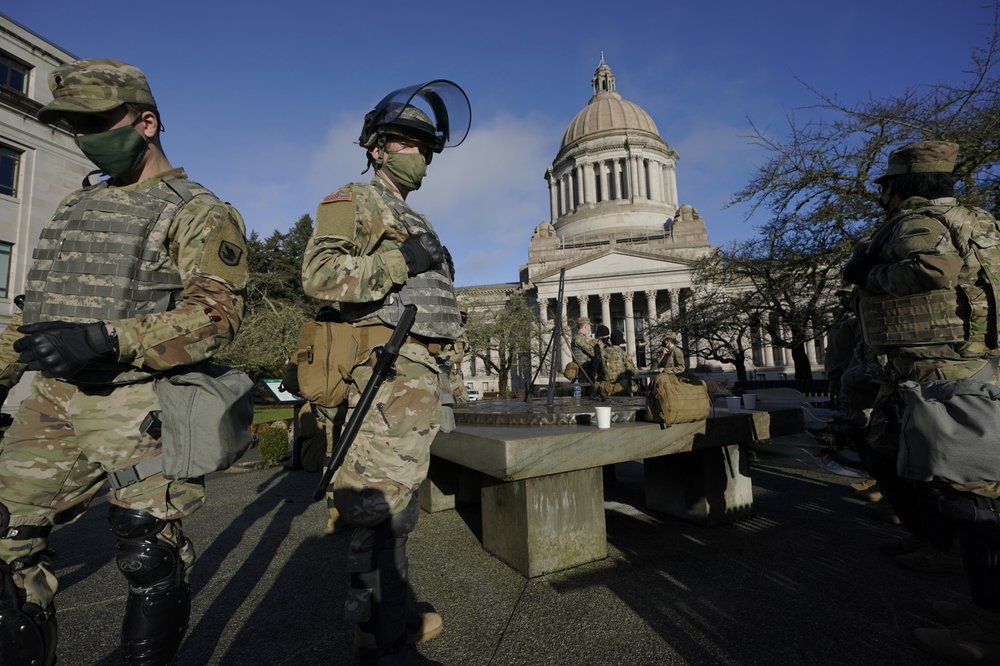
Responding to warnings of potentially violent demonstrations, governors across the nation are calling out National Guard troops, declaring states of emergency and closing their capitols to the public ahead of President-elect Joe Biden’s inauguration next week. Though details remain murky, demonstrations are expected at state capitols beginning Sunday and leading up to Biden’s succession of President Donald Trump on Wednesday. State officials hope to avoid the type of violence that occurred Jan. 6, when a mob of Trump supporters stormed the U.S. Capitol, leaving a Capitol Police officer and four others dead. The FBI has warned of the potential for violence at all state capitols and has said it is tracking an “extensive amount of concerning online chatter,” including calls for armed protests. Governors across the country are sending thousands of National Guard troops to Washington, D.C., where the National Mall has been closed to the general public as part of an intense security effort. More than a dozen governors also have called out the Guard to protect their own state capitols and aid local law enforcement officers. “We are prepared for the worst, but we remain hopeful that those who choose to demonstrate at our Capitol do so peacefully, without violence or destruction of property,” Michigan State Police Col. Joe Gasper said Friday, as Democratic Gov. Gretchen Whitmer announced the Guard’s role. Crews installed a six-foot fence around the Michigan Capitol ahead of expected protests, and ground-level windows were boarded up at a nearby building that houses the governor’s office. Gasper said an increased state police presence would remain at the statehouse at least through mid-February. Some windows also were boarded at capitols in Wisconsin and Illinois, both of which activated the National Guard to help with security. Though the Wisconsin Capitol already was closed to the public because of the coronavirus, Democratic Gov. Tony Evers’ administration told those who had been coming into the Capitol to instead work remotely for the rest of the month. Law enforcement officials were reducing parking around the capitol building in Madison this weekend and urging people to avoid the area as they braced for potential unrest. There was only one known organized event for the day, an anti-fascist demonstration where free food, drinks and clothes were to be distributed. California Gov. Gavin Newsom is mobilizing up to 1,000 National Guard members over concerns of civil unrest. State officials on Thursday erected a chain link fence around the Capitol, bolstering other temporary and permanent barriers. The California Highway Patrol is refusing to issue permits for rallies at the Capitol. “We’re treating this very seriously and deploying significant resources to protect public safety, critical infrastructure and First Amendment Rights,” Newsom said in a video message. “But let me be clear: There will be no tolerance for violence.” Other governors were encouraging people to stay away from capitol buildings during the coming days. Ohio Gov. Mike DeWine, a Republican, closed the Capitol until after Biden’s inauguration and activated hundreds of National Guard members. Citing the possibility of armed protests, Kansas Gov. Laura Kelly on Friday began a one-week restriction on public access to the Capitol. Only those who have business with the Legislature or governor’s office will be allowed inside, and they will have to provide an email showing they have a meeting or are testifying to a legislative committee. Kelly and Pennsylvania Gov. Tom Wolf closed their Capitol buildings for a couple days next week, coinciding with the presidential inauguration. The Pennsylvania Capitol complex already had been closed to the general public because of the coronavirus pandemic, but the new order advises state employees who work in person to take off Tuesday and Wednesday; Monday is the Martin Luther King Jr. holiday. “While we are not aware of any specific threats at this time, we want to act with an abundance of caution to keep employees safe,” Wolf’s administration said on its website. Uncertainty heading into the weekend was a common theme among state officials and law enforcement officers. Many were enhancing security based on past demonstrations or general warnings but without specific expectations about how many protesters, if any, would show up outside state capitol buildings in the coming days. The National Guard is supplementing security at Washington’s capitol, where people broke a gate and entered the grounds of the governor’s mansion last week. But Washington State Patrol spokesman Chris Loftis said Friday that there are “no known explicit threats” detailing the time, place and action of future demonstrations. “We cannot be dismissive of the possible dangers but we should not be alarmists either,” Loftis said in an email to media. The state patrol “has been directed to meet this discomforting uncertainty with caution, preparedness, resolve, and calm — certainly, a wise course of action for all.” Legislatures in several states, including Michigan, also were canceling or limiting their work next week. Oregon’s Legislature will convene Tuesday. But the House and Senate have canceled floor sessions and committee hearings, and there will be no in-person meetings. Senate President Peter Courtney, a Democrat from Salem, said the decision was made after consulting with police. Last month, a violent crowd entered the Oregon Capitol, fought with police and damaged the building. The Republican-led South Carolina House and Senate won’t convene in full session next Tuesday or Wednesday, and committees will meet virtually. The Capitol building will be closed from Saturday through Wednesday “out of an abundance of caution,” state and local authorities said in a joint statement. Republican leaders of the Missouri House also canceled session for next week. Though several House members had expressed security concerns following the unrest in the nation’s capitol, a written statement from GOP leadership cited a rising number of COVID-19 cases in the Capitol building as a reason for the cancellation. New Mexico Gov. Michelle Lujan Grisham, a Democrat, and Utah Gov. Spencer Cox, a Republican, both declared states of emergency on Thursday ahead of potential demonstrations at their capitols. Fencing was installed in a wide radius around
Jo Bonner, Kay Ivey’s chief of staff quarantines as wife tests positive for COVID
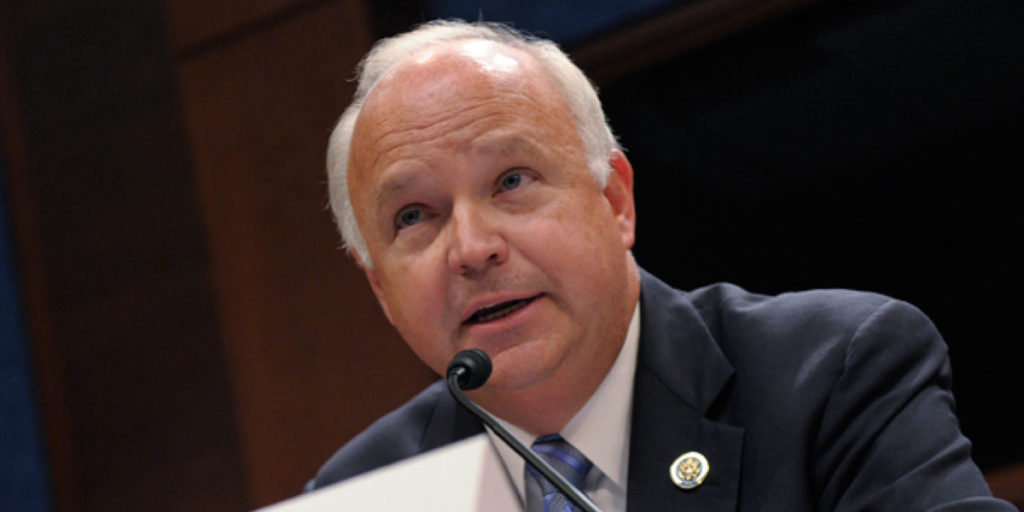
Alabama Gov. Kay Ivey’s chief of staff Jo Bonner quarantining at home after his wife tested positive for COVID-19. Ivey spokeswoman Gina Maiola said Friday that Bonner does not have symptoms but is in quarantine at home. Bonner’s wife took a COVID-19 test after attending a visitation for a funeral last Friday in Mobile where she later learned several other attendees had tested positive for the disease caused by the coronavirus. She does not have symptoms of the virus, but the test was positive. Maiola said Bonner was not with Ivey this week and his wife Janee Bonner has not been around the governor in several months. “Jo is continuing to work from home and will not be back into the office until the normal CDC protocols for exposure have run,” Maiola said. This is the first case of known exposure in the governor’s office. On August 6, 2020, Alabama Today reached out to Maiola after Governor Mike Dewine’s false positive Maiola said that the governor has not had to be tested for COVID to date. She noted, “There have been no positive cases among us at this point. We all take our temperatures upon entrance, wear masks, and practice what the governor is asking of the people of Alabama.” The Associated Press contributed to this report with permission.
Playing electoral defense, Donald Trump claims Joe Biden opposes God
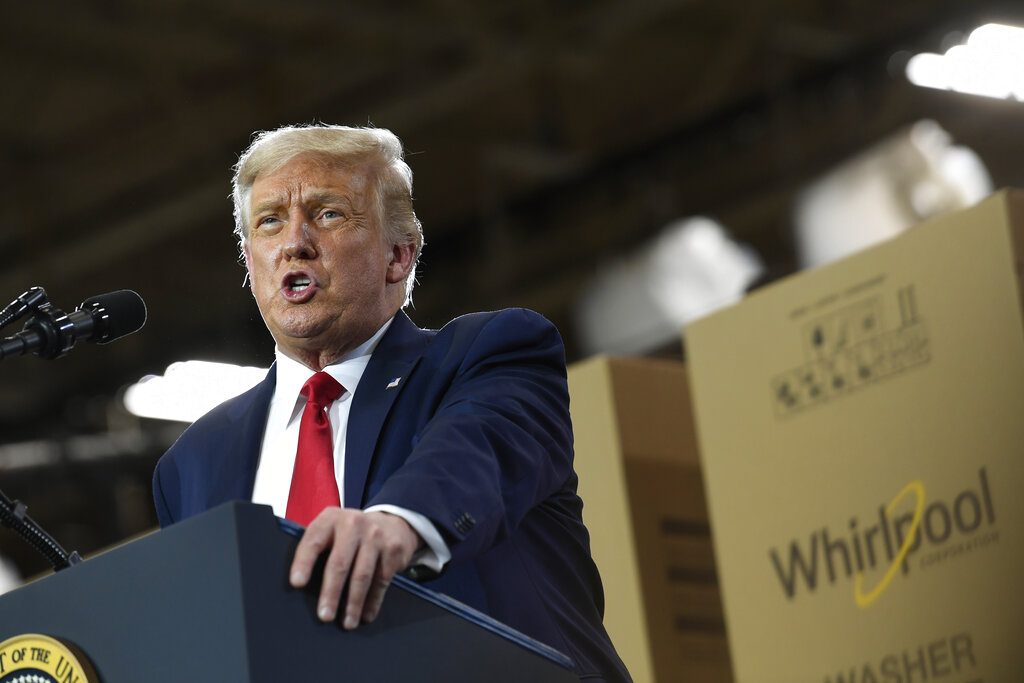
Trump’s remarks stood out and they signaled how contentious the campaign may get over the coming months.
US relief checks begin arriving as economic damage piles up
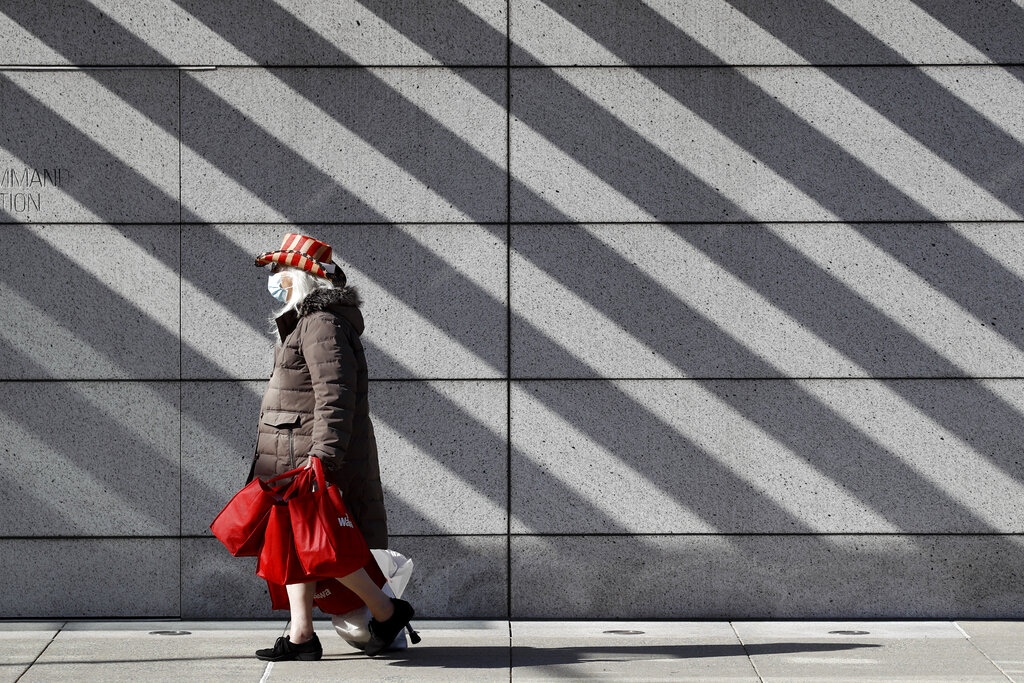
The U.S. government began issuing one-time payments this week to tens of millions of people.


